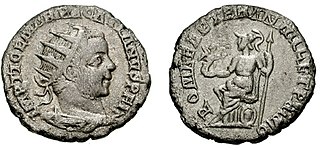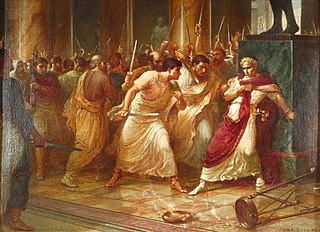Related Research Articles

An anagram is a word or phrase formed by rearranging the letters of a different word or phrase, typically using all the original letters exactly once. For example, the word anagram itself can be rearranged into nag a ram, also the word binary into brainy and the word adobe into abode.

Ab urbe condita, or anno urbis conditae, abbreviated as AUC or AVC, express a date in years since 753 BC, the traditional founding of Rome. It is an expression used in antiquity and by classical historians to refer to a given year in Ancient Rome. In reference to the traditional year of the foundation of Rome, the year 1 BC would be written AUC 753, whereas 1 AD would be AUC 754. The foundation of the Roman Empire in 27 BC would be AUC 727. The common era year 2021 coincides with the AUC year 2774.

Latin is a classical language belonging to the Italic branch of the Indo-European languages. Latin was originally spoken in the area around Rome, known as Latium. Through the power of the Roman Republic, it became the dominant language in Italy, and subsequently throughout the western Roman Empire, before eventually becoming a dead language. Latin has contributed many words to the English language. In particular, Latin roots are used in English descriptions of theology, the sciences, medicine, and law.
In music, biology, and drama, the phrase ad libitum often shortened to "ad lib" or "ad-lib" has various meanings. The roughly synonymous phrase a bene placito is less common but, in its Italian form a piacere, entered the musical lingua franca.
Ad hoc is a Latin phrase meaning literally 'to this'. In English, it typically signifies a solution for a specific purpose, problem, or task rather than a generalized solution adaptable to collateral instances.

E pluribus unum – Latin for "Out of many, one" – is a traditional motto of the United States, appearing on the Great Seal along with Annuit cœptis and Novus ordo seclorum ; its inclusion on the seal was approved by an Act of Congress in 1782. While its status as national motto was for many years unofficial, E pluribus unum was still considered the de facto motto of the United States from its early history. Eventually, the United States Congress passed an act, adopting "In God We Trust" as the official motto in 1956.
Ad infinitum is a Latin phrase meaning "to infinity" or "forevermore".

A Prelate of Honour of His Holiness is a Catholic prelate to whom the Pope has granted this title of honour. They are addressed as Monsignor and have certain privileges as regards clerical clothing.
Cui bono?, in English "to whom is it a benefit?", is a Latin phrase about identifying crime suspects. It expresses the view that crimes are often committed to benefit their perpetrators, especially financially. Which party benefits may not be obvious, and there may be a scapegoat.

Et tu, Brute? is a Latin phrase literally meaning "and you, Brutus?" or "also you, Brutus?", often translated as "You as well, Brutus?", "You too, Brutus?", or "Even you, Brutus?". The quote appears in Act 3 Scene 1 of William Shakespeare's play Julius Caesar, where it is spoken by the Roman dictator Julius Caesar, at the moment of his assassination, to his friend Marcus Junius Brutus, upon recognizing him as one of the assassins. The first known occurrences of the phrase are said to be in two earlier Elizabethan plays; Henry VI, Part 3 by Shakespeare, and an even earlier play, Caesar Interfectus, by Richard Edes. The phrase is often used apart from the plays to signify an unexpected betrayal by a friend.
Ermoldus Nigellus, or Niger—translated Ermold the Black, or Ermoald, was a poet who lived at the court of Pippin of Aquitaine, son of Frankish Emperor Louis I, and accompanied him on a campaign into Brittany in 824. Ermoldus was a cultured man with a knowledge of the Latin poets, and his poem, In honorem Hludovici imperatoris, has some historical value. It consists of four books and deals with the life and exploits of Louis from 781 to 826. He also wrote two poems in imitation of Ovid, which were addressed to Pippin.
Owing to its origin in ancient Greece and Rome, English rhetorical theory frequently employs Greek and Latin words as terms of art. This page explains commonly used rhetorical terms in alphabetical order. The brief definitions here are intended to serve as a quick reference rather than an in-depth discussion. For more information, click the terms.

Per ardua ad astra is a Latin phrase meaning "through adversity to the stars" or "through struggle to the stars" that is the official motto of the Royal Air Force and other Commonwealth air forces such as the Royal Australian Air Force and Royal New Zealand Air Force, as well as the Royal Indian Air Force until 1947. The Royal Canadian Air Force used it until 1968, when it adopted the motto sic itur ad astra, a similar phrase meaning "such is the pathway to the stars". It dates from 1912, when it was adopted by the newly formed Royal Flying Corps.

Soli Deo gloria is a Latin term for Glory to God alone. It has been used by artists like Johann Sebastian Bach, George Frideric Handel, and Christoph Graupner to signify that the work was produced for the sake of praising God. The phrase has become one of the five solae propounded to summarise the Reformers' basic beliefs during the Protestant Reformation.

Peter of Eboli or Petrus de Ebulo was a didactic versifier and chronicler who wrote in Latin.

Canticum Sacrum ad Honorem Sancti Marci Nominis is a 17-minute choral-orchestral piece composed in 1955 by Igor Stravinsky (1882–1971) in tribute "To the City of Venice, in praise of its Patron Saint, the Blessed Mark, Apostle." The piece is compact and stylistically varied, ranging from established neoclassical modes to experimental new techniques. The second movement, "Surge, Aquilo", represents Stravinsky's first movement based entirely on a tone row.

The Liber ad honorem Augusti sive de rebus Siculis is an illustrated narrative epic in Latin elegiac couplets, written in Palermo in 1196 by Peter of Eboli. The presentation copy, ordered by chancellor Conrad of Querfurt, is now MS. 120 II of the Berne Municipal Library.

Avē Imperātor, moritūrī tē salūtant is a well-known Latin phrase quoted in Suetonius, De vita Caesarum. It was reportedly used during an event in AD 52 on Lake Fucinus by naumachiarii—captives and criminals fated to die fighting during mock naval encounters—in the presence of the emperor Claudius. Suetonius reports that Claudius replied "Aut nōn".
Pi Mu, (ΠΜ), was an honor society for medical students, founded in 1892. It merged with Phi Chi, a similar society, in 1922.

Ad maiorem Dei gloriam or Ad majórem Dei glóriam, also rendered as the abbreviation AMDG, is the Latin motto of the Society of Jesus (Jesuits), an order of the Catholic Church. It means "For the greater glory of God."